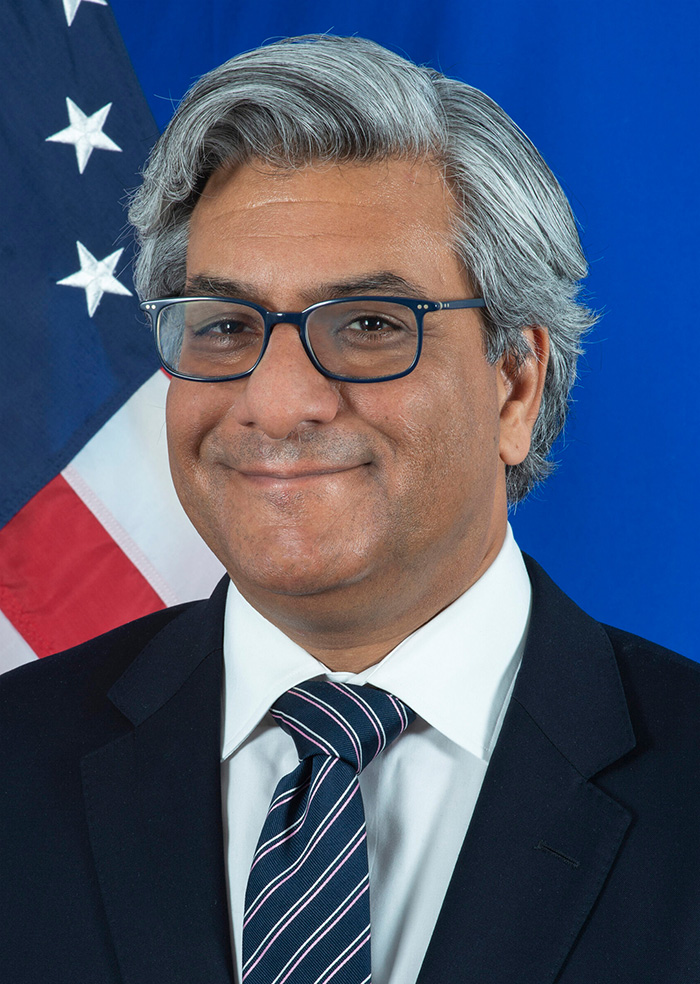Exploring the Secretary’s Modernization Agenda: A Q&A with Policy Planning Director Salman Ahmed

Salman Ahmed is the director of the Secretary of State’s Policy Planning Staff. Prior to his appointment on Jan. 20, 2021, he was a senior fellow at the Carnegie Endowment for International Peace, where he led a bipartisan task force dedicated to making U.S. foreign policy work better for the middle class. He also oversaw the review of the national security and foreign policy agencies for the Biden-Harris Transition Team. He served in the Obama-Biden administration as special assistant to the president and senior director for strategic planning at the National Security Council and as chief of staff of the U.S. Mission to the United Nations. Before joining the government, he served for almost 15 years with the United Nations and taught at Princeton University’s School of Public and International Affairs.
Secretary of State Antony Blinken announced in October a major reform and modernization plan that included steps to increase debate and new thinking at the State Department, among many other initiatives. As the Secretary’s brain trust, the Policy Planning Staff has been deeply involved in crafting and implementing the plan.
In the January-February Journal, we interviewed the Secretary about his plans. To continue the conversation about the reform efforts, we are delighted to offer this Q&A with Director of the Policy Planning Staff Salman Ahmed to dig deeper into the specifics of the new Policy Ideas Channel and revitalization of the Dissent Channel.
—Shawn Dorman, Editor
FSJ: What led to creation of the Policy Ideas Channel? How will it work?
Director Ahmed: When the Secretary asked me to lead his Policy Planning Staff, he made clear the most important role we could play would be to challenge groupthink and inject new perspective and ideas from within and outside the State Department. The concept of a Policy Ideas Channel was his—he saw it as the natural counterpart to the Dissent Channel. Just as dissent makes our institution stronger, so does a culture that welcomes, promotes and pursues good ideas regardless of where they come from or from whom. The hard truth is that bureaucracy doesn’t always elevate those ideas, and at times suffocates them. Our aim was not to circumvent the rigor and debate of our policymaking processes, but to make sure we did not deprive ourselves of fresh thinking at a moment that demands us to think and work in new ways.
We consulted widely across the department in setting up the channel, drawing on lessons learned from existing initiatives like the Bureau of Global Talent Management’s Innovation Portal and past efforts like the Sounding Board, and making sure that use of the channel is considered and disciplined. Submitters must include explanations of how they’ve pushed their policy idea with their leadership chain and relevant bureaus and offices, the nature of the feedback they received and obstacles they faced, as well as why they decided to use the channel.
After receiving an idea, my colleagues in S/P will do a careful assessment, including by engaging with relevant bureaus and offices, who will have a chance to provide reactions and input. Leadership will review the submissions and ask relevant bureaus and offices to act on the most promising initiatives. Like with the Dissent Channel, authors can choose to have their identity protected, and we will ensure no employee suffers any retribution for having the courage to put their idea forward.
FSJ: What, if any, plans are there to revive the Open Forum?
Director Ahmed: We plan to relaunch the Open Forum in 2022 as another venue to enrich the intellectual life of the department, bring diverse perspectives to bear on our work, and stretch our collective imagination about over-the-horizon challenges and opportunities for American diplomacy. The Open Forum was created in 1967 during the intense policy debates around the Vietnam War to promote discourse and debate. It has taken many forms over the years, and we will endeavor to ensure it is relevant and responsive to the consequential choices and challenges before us.
FSJ: What wasn’t working with the Dissent Channel that led to the recent emphasis on “revitalizing” it?
Director Ahmed: The Dissent Channel serves an essential function. It enables employees to convey policy disagreements directly to the attention of the Secretary and his leadership team. But the Dissent Channel is about more than just employees using the channel and their substantive disagreements—it is also about the department’s leadership, who have a responsibility to seriously weigh dissents, respond to them in a timely fashion, protect the confidentiality of the authors and ensure there will be no retribution against them. The Dissent Channel, therefore, is a two-way street. Dissent should be welcomed and protected. And dissenting views should be conveyed internally through the channel.
Our goal is to reinforce this sense of confidence in the Dissent Channel and demonstrate that when employees and leadership each live up to their end of the bargain, it can make a real difference. At every opportunity, the Secretary has made clear he believes dissent is patriotic and makes our institution stronger. He personally reviews each dissent and reply, and asks for updates on follow-through actions when we’ve committed to take them.
Part of the revitalization effort is about doing a better job explaining to the State Department and USAID community how and when to use the Dissent Channel, and how to appropriately support and protect those who do. We are grateful to AFSA and President Eric Rubin for their leadership and partnership in this endeavor and to President Rubin for emphasizing the importance of “constructive internal dissent.”
The Secretary has also made clear that dissenting views should not be reserved for the Dissent Channel alone. Constructive, respectful disagreement should be part of the work we’re all doing, every day. I know the Secretary looks to everyone to weigh in when they disagree with a decision or want to propose an alternative approach—during meetings, in policy memos and at other moments in our everyday work. And he’s said to his leadership team and to chiefs of mission that he expects them to create a culture where dissenting voices are heard and valued.
FSJ: Can you give any examples of recent policy ideas or dissent messages that have led to policy changes?
Director Ahmed: We’ve received more than a dozen dissent messages over the past year that recommend significant policy changes. At a minimum, each recommendation received a full hearing. In some cases, they helped to provide further confidence to move ahead on policy changes already being contemplated. In others, they prompted a second look at the policy, even if not ultimately leading to the change recommended. In others, leadership did not agree with the recommended action, because they had a different perspective and broader considerations to weigh, which was conveyed in the response.
In the case of the Policy Ideas Channel, it’s too early to expect concrete changes to have arisen as a result of the more than 10 submissions received in the first 30 days alone. We’re still engaging with the drafters on a number of these and look forward to receiving more submissions in the weeks and months ahead.
Beyond these specific initiatives, we’re looking at creating a culture of innovation across the department.
–Salman Ahmed
FSJ: S/P is closely involved in the Secretary’s broader modernization agenda. Beyond the Policy Ideas Channel, how else will that agenda promote innovation within the department?
Director Ahmed: I would encourage all your readers, if they have not done so already, to watch or read the Secretary’s October speech at FSI on modernizing American diplomacy. One of the pillars of the Secretary’s modernization agenda involves elevating new voices and fostering a climate of initiative and innovation. This includes launching the Policy Ideas Channel, revitalizing the Dissent Channel and reviving the Open Forum.
Beyond these specific initiatives, we’re looking at creating a culture of innovation across the department. This includes prioritizing collaboration across regional and functional lines to ensure we can harness the combined strength of the entire department to make progress on the challenges that matter most, because the reality is that many of the issues that are now among the most central to our national security—from climate to economics to technology—are functional issues that have not historically had primacy in our bilateral relationships. We need to think about new ways of elevating the focus on functional issues within the department, including the ways we incentivize people to work on those issues and how we integrate functional expertise at our posts overseas.
We likewise need to do more to integrate bilateral, regional and multilateral diplomacy. And we need better mechanisms to pull the department together, so that regional, functional, bilateral and multilateral diplomacy can be combined to greatest effect. That will be especially important when it comes to strategic competition with China. That’s why the Secretary asked Deputy Secretary Wendy Sherman to lead a cross-department structure on China to ensure a more comprehensive approach with all stakeholders at the table.
We must also become an institution that does a better job of capturing lessons from our work. That’s why the Secretary asked Career Ambassador Dan Smith to lead an After Action Review of the department’s efforts in implementing the end of the U.S. military mission in Afghanistan.
We’re also committed to providing our team with the latest technology and tools so they can collaborate more effectively and securely and have better access to data. And we intend to work with Congress to update our risk management practices so our team in the field can get out more to conduct the kind of on-the-ground, in-person diplomacy that is essential to advance U.S. goals. This is often where the most innovation happens. Finally, we need to look at workforce reforms that help incentivize initiative and innovation.
The Secretary has been clear the agenda he laid out in October is the floor, not the ceiling, of our ambitions. We have a window before us to make historic, lasting change. And we are determined to seize it, with the partnership and support of the entire department.
FSJ: When you were outside government you wrote a series of reports on “foreign policy for the middle class.” One year into the administration, how has that vision translated into practice? What is the department’s role?
Director Ahmed: President Biden and Secretary Blinken have said our foreign policy must deliver for Americans at home. On one level, that certainly includes the important work the State Department has always done—and must continue to do—to promote our alliances; protect Americans from terrorism, proliferation and armed conflict; and preserve access to the key arteries of global commerce. This is not a prescription for retrenchment, isolationism or unilateralism. Strong and confident American leadership abroad, working in lockstep with our allies and partners, is essential to advance the well-being of the American people at home. At the same time, if we’re not disciplined about understanding which conflicts or crises around the world are truly integral to U.S. security and prosperity, we can end up in situations of U.S. overreach or overextension that ultimately don’t produce benefits—and may entail costs—at home and come at the expense of focus on other issues that are arguably more important to Americans’ well-being.
So, at its core, a foreign policy for the middle class implies a fundamental reorientation of our diplomacy to focus more on the global issues that have the most direct impact on Americans’ livelihoods and well-being, including addressing the climate crisis and helping American businesses and workers thrive in the green economy; protecting critical infrastructure, data and supply chains; promoting U.S. technological leadership; pushing back on coercive economic practices that disadvantage U.S. workers and businesses; and anticipating and heading off global developments that could precipitate catastrophic shocks to the U.S. economy. And there is nothing more urgent or important right now to Americans’ well-being than our work to end the COVID-19 pandemic around the world.
Not by coincidence, these are the issues that underpin the Secretary’s modernization effort, including our work to build our capacity and expertise in cyber security and emerging technologies, climate, global health, economics and multilateral diplomacy. And it’s why the Secretary is committed to enhancing our domestic travel and engagement. We need to get beyond the Beltway and engage more regularly with governors, mayors, community leaders, small and medium-sized business owners and local unions, among others, to ensure their lived experiences inform our sense of the national economic interests we are advancing abroad.
In terms of how a foreign policy for the middle class plays out in practice, you’ve seen this in new initiatives like the U.S.-E.U. Trade and Technology Council, which provides us a dedicated forum to shape the most important rules, norms and standards on trade and technology, so that American workers and businesses can compete in the 21st-century digital economy on a fair, level playing field. You’ve seen it in our work to bring together well over 100 countries to secure a global minimum tax to end the race to the bottom on corporate tax rates. And it’s reflected in U.S. leadership on climate and COVID-19.
Read More...
- “On Moves to Modernize: An Interview with Secretary of State Antony Blinken,” The Foreign Service Journal, January-February 2022
- “Notes to the New Administration,” by collected authors, The Foreign Service Journal, March 2021
- “Planning in the Department,” by George Kennan, Paul Nitze, and Robert Bowie, The Foreign Service Journal, March 1961





